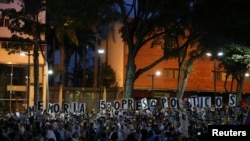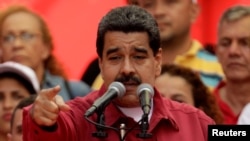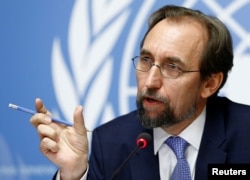Before his first address to the U.N. General Assembly, U.S. President Donald Trump said he wanted democracy restored to Venezuela and warned the U.S. may take additional steps to restore stability to the oil-producing nation.
"We are prepared to take further action if the government of Venezuela persists on the path to imposing authoritarian rule on the Venezuelan people," Trump said at a working dinner he hosted Monday with Latin American leaders.
The leaders discussed Venezuela’s political and economic crisis, regional security and economy, and the need to reign in socialist President Nicolas Maduro.
"His corrupt regime destroyed a thriving nation by imposing a failed ideology that has produced poverty and despair everywhere it has been tried," Trump said.
Trump was joined by his counterparts from Brazil (Michel Temer), Colombia (Juan Manuel Santos), Panama (Juan Carlos Varela) and Peru (Pedro Kuczynski).
Trump thanked the Latin American leaders for providing "vital support to the Venezuelan people." After the dinner, Brazilian President Michel Temer said all the leaders present agreed to increase international pressure on Maduro's government without intervening directly in Venezuela.
The Trump administration has already applied financial sanctions against the country and has not ruled out military intervention. Maduro has blamed Venezuela's financial problems on an alleged "economic war" by domestic opponents and the United States.
Latin American governments have called for negotiations to resolve the Venezuelan crisis through a peaceful transition to democracy and without the use of military force.
"Evidently, everyone at the table wants a democratic solution in Venezuela, but no one wants a foreign intervention," Temer said.
Maduro will be conspicuously absent at the United Nations. Venezuelan Foreign Minister Jorge Arreaza has said the leader is “very busy with regional elections, working on economic matters” and on the controversial new national constituent assembly he assigned to rewrite the country’s constitution. That powerful new assembly has tried to wrest power from the internationally recognized legislative branch, the National Assembly.
Arreaza instead will represent Venezuela and is to address the international body Thursday.
The Trump administration has labeled Maduro “a dictator” and has refused to recognize the new assembly,
The U.S. Treasury Department has personally sanctioned Maduro, freezing his assets under U.S. jurisdiction – though it’s unclear just what, if any, those might be – and forbidding any U.S. citizen from doing business with him.
Years of deepening political and economic turmoil in the South American nation reached desperate levels in early April. Venezuelans began staging massive street protests to demand regional and presidential elections, the release of political prisoners and access to humanitarian aid. More than 120 people died in protest-related clashes. But suffering is widespread in the oil-rich country of 32 million, with triple-digit inflation, rampant hunger and soaring crime rates.
Last week, U.N. High Commissioner for Human Rights Zeid Ra'ad Al Hussein called for a criminal investigation into allegations that Maduro’s government has used excessive force against protesters and otherwise tried to suppress political opposition.
“There is a very real danger that tensions will further escalate, with the government crushing democratic institutions and critical voices,” Hussein told the U.N. Human Rights Council.
Last Thursday, the Organization of American States began public hearings on whether the Maduro government should be referred to the International Criminal Court (ICC).
Arreaza, the Venezuelan foreign minister, refutes allegations of rights abuses, saying they’ve been concocted as excuses to meddle in the country’s internal affairs.
Venezuela’s government and its political opposition hit an impasse after two days of meetings last week in the Dominican Republic. Under discussion are setting a 2018 date for presidential elections and respecting the National Assembly.
“We are supporting those [peace] efforts, hoping that there will be some result,” White House spokeswoman Lydia Barraza told VOA on Monday. She added that the U.N. Human Rights Council must look critically at the “violation of human rights” and Venezuela’s constitution.
U.S. Secretary of State Rex Tillerson plans to meet Wednesday with some of the 12 signatories of the OAS Lima Declaration, which pledges to “explore ways to contribute to the restoration of democracy” in Venezuela “through peaceful and negotiated means.”
Brazil, Colombia, Panama and Peru are among the signatories, along with Argentina, Canada, Chile, Costa Rica, Guatemala, Honduras, Mexico and Paraguay.
VOA White House correspondent Pete Heinlein contributed to this report from New York and Spanish Service correspondent Alvaro Algarra assisted from Caracas, Venezuela













